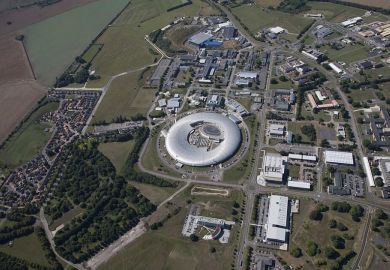Academics may not be fully aware of the wealth of funding opportunities available to them from the Technology Strategy Board, which invests in business-led research and development.
But the TSB, which was a major winner in the Comprehensive Spending Review and which last year was granted some degree of independence from the Government, has Pounds 1 billion to invest by 2010-11, so researchers ignore it at their peril, according to its head, Iain Gray.
"The TSB is about creating wealth, about collaborating with business, so universities need to align themselves with business thinking" if they want researchers to win a share of the cash, said Mr Gray, the board's first chief executive.
The TSB's budget is about £200 million a year, but this will rise to Pounds 300 million following government acceptance of a recommendation in the Sainsbury review of science and innovation to expand it.
The £1 billion that the TSB has to spend on business innovation over the three-year CSR period includes £180 million from the regional development agencies, and a pot of £130 million from the seven research councils. Contributions range from £2.5 million from the Arts and Humanities Research Council to Pounds 45 million from the Engineering and Physical Sciences Research Council.
It is the research councils' £130 million component, managed by the TSB, that is available to academics through the board's "collaborative research and development competitions".
"Universities can be expected to receive about 10 per cent of the TSB's total funding for collaborative R&D competitions, but it is not ring-fenced," Mr Gray said. "They have to align their research to the TSB."
One area that the TSB has decided to fund for the first time this year is the creative industries, Mr Gray said. The details of the call will be issued at the end of the month, but the idea is to focus on the underlying technology the UK needs if it is to be keep pace as a world creative hub in all sorts of industries ranging from animation to textiles.
"A very significant wealth creation element in the UK comes from the creative industries. It is an area we need to invest in to maximise business benefit back to the UK."
Seven other areas are also part of the current collaborative R&D competition. Proposals are being sought in the areas of materials for energy, high-value manufacturing and cell therapy, with a closing date of 14 February. Proposals in low-carbon energy technologies, advanced lighting, lasers and displays and technologies for health will close on March.
A call for proposals for gathering data in complex environments - which deal with how technology can help businesses manage their data better - will open along with creative industries on 30 January.
In all, £100 million is available in the current cycle, with each area typically attracting about £10 million. Individual collaborative projects can receive up to £2 million over two or three years.
As to how academics can establish relationships with business partners and work up proposals for TSB funding, Mr Gray points to the existing 24 Knowledge Transfer Networks, which serve as platforms for communication in different fields. "My tip would be to use these communities to understand the scope of what these calls (for proposals) are and influence future calls."
Mr Gray added that the TSB was in the final stages of creating a KTN for the creative industries and would launch a new overall strategy in April. He urged interested academics to contact relevant KTNs early rather than waiting for competition announcements and then trying to get involved, as it was often too late.
As well as collaborative R&D funding competitions, the TSB is developing "innovation platforms", where there is also room for academic involvement. Via these, the Government puts forward major issues facing society, and the TSB and research councils work with businesses and academics to develop suitable R&D projects to address them.
Thus far, four innovation platforms have been launched: intelligent transport systems, network security, low-carbon vehicles, and assisted living. This has led to calls for projects in the area of intelligent transport systems, with calls in network security to come shortly.
Work on assisted living, in conjunction with the Medical Research Council and the Biotechnology and Biological Sciences Research Council, is in its early stages.
The TSB encourages academics to become involved, either as a source of ideas for projects or in helping companies to develop projects.
Register to continue
Why register?
- Registration is free and only takes a moment
- Once registered, you can read 3 articles a month
- Sign up for our newsletter
Subscribe
Or subscribe for unlimited access to:
- Unlimited access to news, views, insights & reviews
- Digital editions
- Digital access to THE’s university and college rankings analysis
Already registered or a current subscriber?



